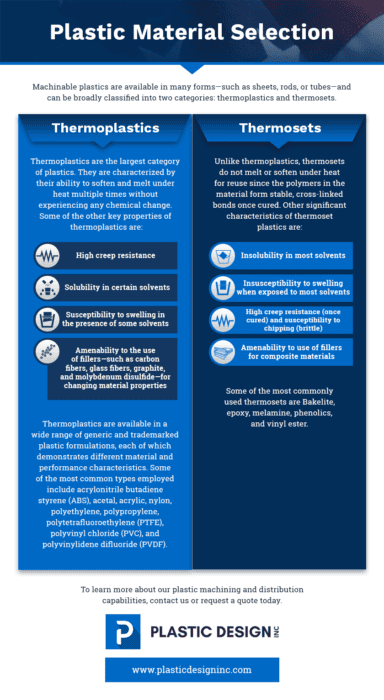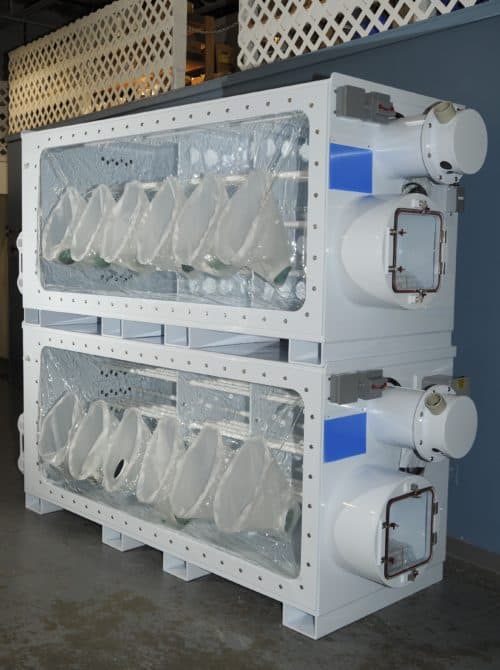When manufacturing plastic components, many companies turn to molding techniques to produce the necessary parts and products. However, this method often proves expensive and time consuming.
Machining serves as an alternative to molding that creates small quantities of complex and close tolerance plastic parts quickly. Since the workpiece has to be rigid enough to withstand operations without warping or bending, not all types of plastics are suitable for machining. Despite these restrictions, there remain several plastics of varying costs and performance characteristics that are machinable.
Plastic Material Selection
Machinable plastics are available in many forms—such as sheets, rods, or tubes—and can be broadly classified into two categories: thermoplastics and thermosets.
 Thermoplastics
Thermoplastics
Thermoplastics are the largest category of plastics. They are characterized by their ability to soften and melt under heat multiple times without experiencing any chemical change. Some of the other key properties of thermoplastics are:
- High creep resistance
- Solubility in certain solvents
- Susceptibility to swelling in the presence of some solvents
- Amenability to the use of fillers—such as carbon fibers, glass fibers, graphite, and molybdenum disulfide—for changing material properties
Thermoplastics are available in a wide range of generic and trademarked plastic formulations, each of which demonstrates different material and performance characteristics. Some of the most common types employed include acrylonitrile butadiene styrene (ABS), acetal, acrylic, nylon, polyethylene, polypropylene, polytetrafluoroethylene (PTFE), polyvinyl chloride (PVC), and polyvinylidene difluoride (PVDF).
Thermosets
Unlike thermoplastics, thermosets do not melt or soften under heat for reuse since the polymers in the material form stable, cross-linked bonds once cured. Other significant characteristics of thermoset plastics are:
- Insolubility in most solvents
- Insusceptibility to swelling when exposed to most solvents
- High creep resistance (once cured) and susceptibility to chipping (brittle)
- Amenability to use of fillers for composite materials
Some of the most commonly used thermosets are Bakelite, epoxy, melamine, phenolics, and vinyl ester.
Material Characteristics of Common Machined Plastics
When selecting a plastic material for a machining application, there are two main factors to consider: (a) suitability of the plastic’s properties for the application and (b) its suitability for machining. Some of the characteristics that machined plastic parts can have are:
- Biocompatibility: targeted toward medical and pharmaceutical applications where machined parts must not cause biological reactions in patients
- Chemical resistance: important for parts used in the agricultural, chemical, and food and beverage industries as parts must not dissolve or degrade when they come in contact with chemicals
- Dimensional stability: an important property for outdoor parts that are exposed to varying stress and environmental conditions
- FDA classification: plastics used in food and beverage industry applications must be approved by the FDA
- Impact resistance: some plastics, such as polycarbonate, offer greater impact resistance than glass, making them suitable for use in high impact or stress applications
- Loading strength: the ability of the plastic to withstand compressive and tensile loads
- Temperature resistance: depending on the specifications of the application, the plastic material must be able to perform well under a wide range of temperatures
- UV resistance: an important property for outdoor applications
- Wear resistance: plastic parts used in high speed or high torque applications must have good resistance to wear
Industries and Applications
Machined plastic parts find application across a diverse set of industries as components of cabinets, carts, enclosures and tanks, fume hoods, laboratory equipment, light lenses, point-of-purchase (POP) displays, sign holders, and more. Some of the industries that use machined plastic parts are:
- Biomedical

- Electronics
- Life sciences and animal research
- Lighting
- Marine
- Original equipment manufacturing (OEM)
- Pharmaceutical
- Photonics
- Recreational
- Semiconductor
Plastic Solutions From Plastic Design, Inc.
At Plastic Design, Inc., we have over 40 years of experience designing, prototyping, and manufacturing machined plastic parts for a wide range of industries. We can fabricate parts to standards such as Factory Mutual, Semi, NFPA, and OSHA or custom specifications and maintain ISO 9001:2015, I.P.C.A. 620, and confined space entry certifications. Regardless of whether you need a one-off prototype or a large production run, we can meet your machined plastic needs.
In addition to our design and manufacturing capabilities, we also offer the following services:
- On-site installation
- Support
- Stocking and distribution of plastic materials in various forms, including extruded and molded rods, sheets, and flexible and rigid tubes.
To learn more about our plastic machining and distribution capabilities, contact us or request a quote today.






Comments are closed